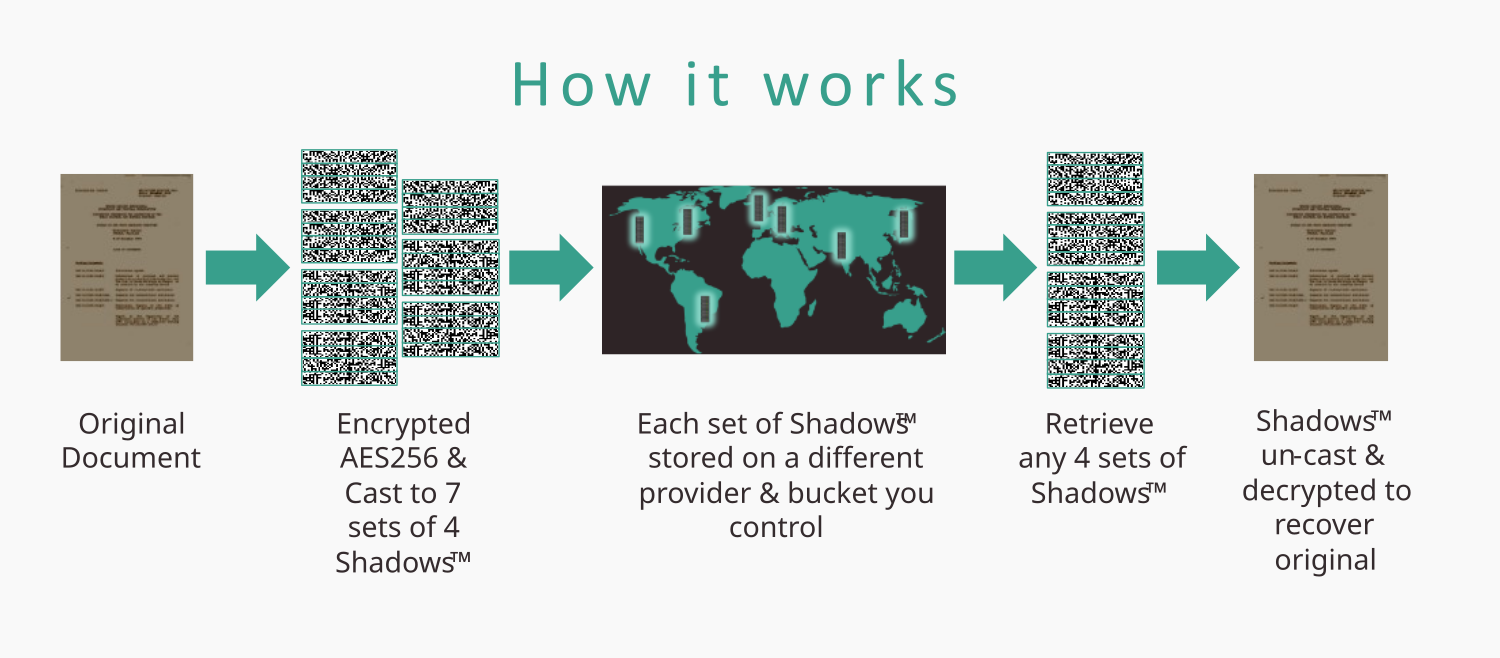Resilience without the cost penalty
Cloud providers encourage you to try and implement resilience by keeping a second copy of all your data on one of their other regional nodes. This provides an alternative if the first site fails, but in doing so the cost of storage doubles. What's more, having an alternative region with the same provider does't guard against systematic problems that affect all of their sites simultaneously, nor against a cascade failure where a first region failing sheds that load to a second region, and that second region then fails due to the increased load. So, in practice, everyone keeps a third copy off-cloud.
With Umbra ShadowStream you don't need to keep three copies of everything to be secure. 7 shadows provides more protection - against failure of upto 3 providers- but does so requiring only 1.75x the original amount of storage. That's more than 40% saving compared to current best-practice.
Pick 7, depend on any 4
Versioning with less wasted storage
Versioning is a powerful technique that can be applied to mitigate a wide range of damaging events from ransomware through to administration errors. With a conventional architecture, each replica is as large as the original document; so copies proliferate. Versioning of the shadows on Umbra provides the same protection with fewer wasted bytes of storage consumed.
Freedom to pick low-cost providers
There are more than 30 S3 compatible storage providers, and their price, reputation, and uptime vary wildly. Umbra monitors many of them 24/7 to build a picture of their performance and reliability. We know that they all have “blips” and inconsistencies in their performance, but from the data we also monitor their pricing and there are very large variations in what they charge.
Understandably, most people don't want to trust smaller suppliers to maintain their data and adequate up-time. With Umbra that risk is spread, so the other providers can take up the load if one is temporarily unavailable. That means that you can reduce your average cost of storage from perhaps $23 per TB per month to less than $10 per TB per month, whilst improving your security and reliability.

Simplicity
No more manual back-ups of S3-type storage, no more wrestling with complicated setup or key management. Umbra is intrinsically secure.
Unneeded shadows are disregarded, keeping your connection fast.

Confidence
Every Shadow™ is mathematically provably undecryptable, reducing your risk of data loss, and Ransomware attacks on cloud buckets are detected and mitigated early.
The service tolerates seamlessly up-to 3 of the cloud providers being permanently or temporarily offline. So your application stays live.
National Critical Infrastructure projects require cloud provider resilience. Umbra provides that element for your cloud object storage.
No gap in coverage as backup is continuous, not periodic.
Early detection and isolation of ransomware.
We are so confident in ShadowStream's security, we are preparing a competition for anyone able to extract usable data from a shadow.

Value
Best practice for conventional S3-type storage demands you set up cross region replication (on its own, doubling your storage cost), and off-cloud backup. Storing three copies of everything to provide a limited 1-fault tolerant system. This also triples your attack surface.
Once you no longer rely on a single provider and can tolerate outages, you are free to select storage from the many alternatives costing far less than the premium providers for some or all of your underlying storage providers. Lowering your average cost per TB. Depending on your application and requirements, savings in total costs of 20-40% are commonplace.

Environmental
Cloud Object Storage accounts for 830 million tonnes of CO2 per year, nearly the same as all airlines combined.
Umbra reduces the total amount of storage required, resulting in savings of around 41% in the total carbon footprint.
